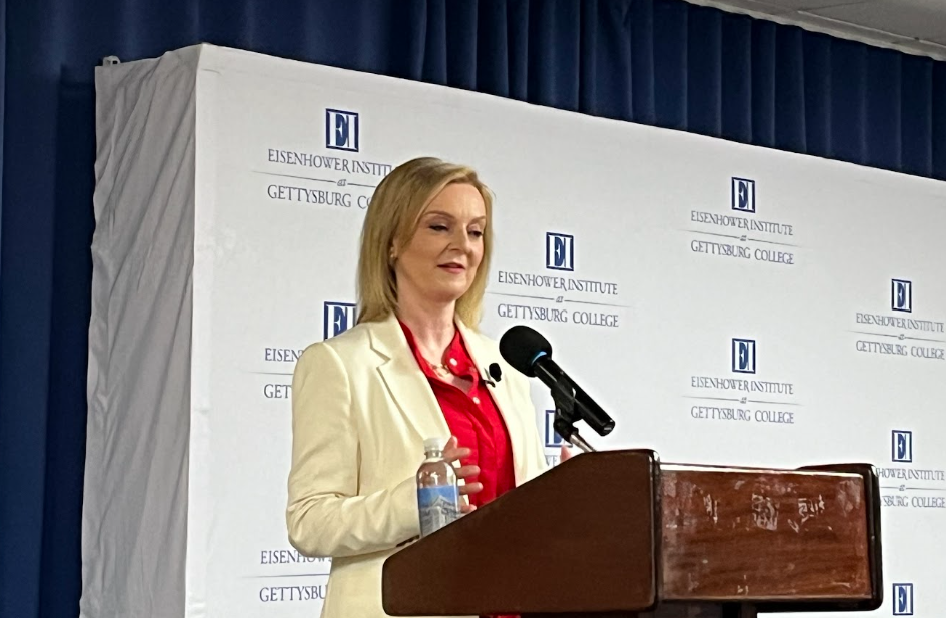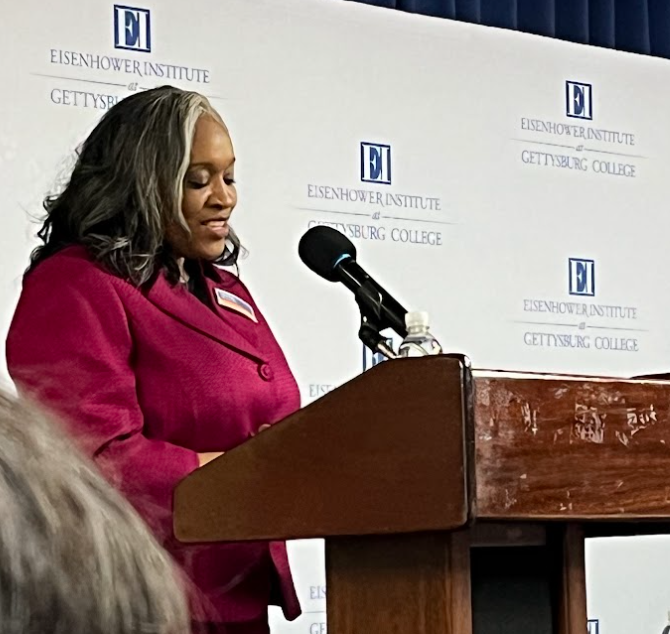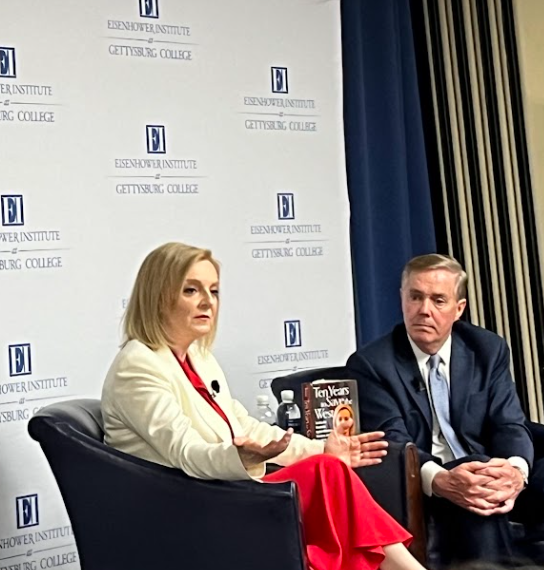By Brandon Fey, Assistant News Editor
56th Prime Minister and current Member of Parliament of the United Kingdom Liz Truss was the guest speaker at the 2024 Henry M. Scharf Memorial Lecture on Current Affairs, presented by the Eisenhower Institute (EI) at Gettysburg College. The lecture was held on Thursday, April 18 at the National Press Club in Washington D.C.
The Scharf Lecture was established by Dr. F. William Sunderman in 1977 in memory of Gettysburg College graduate Henry Scharf, who is credited with constructing the Majestic Theater in Gettysburg. The lecture focuses on current events and has been given by several renowned figures in politics, academia, the sciences and other relevant fields. Truss was invited to speak as part of her ongoing American book tour as she promotes her recently published book, “Ten Years to Save The West: Lessons from the Only Conservative in the Room.”
The program began with welcoming remarks from Eisenhower Institute Executive Director Tracie Potts. Potts highlighted the Eisenhower Institute’s mission to connect future leaders with experts in policy public to inspire meaningful action. She introduced Truss, who then came to the podium and began her lecture, titled, “Fighting for Freedom: Why the West Needs Small-State Conservatism.”
Truss opened with a reflection on the current lack of conservative leadership in Western governments and posed the question of why it seems that conservative policies have lost popularity in recent years. Because of this trend, she argued, left-wing ideologies have become mainstream in politics, particularly in the UK, which has led to a greater amount of power held by the government. She stated that unelected officials and bureaucrats have gained a sizable amount of power in the UK over the past 25 years, which undermines democratic values, as they are not held directly accountable to voters. She cited measures taken by former Prime Minister Tony Blair, including his changes to the UK’s legal system which limited the power of democratically elected politicians in favor of bureaucrats.
In addition to this, Truss blamed neoliberal policies in recent decades for some of the international and domestic issues facing the UK. She mentioned how globalist trade policies have enabled the economic growth of hostile governments in China and Russia, without encouraging democratic reforms.
Conversely, Truss stated, high taxes in the UK have led to economic stagnation and the unnecessary growth of government without regulation. She expressed her frustration at the failure of her country to take advantage of Brexit by freeing itself from stifling EU economic policies, including certain caps on working hours. Truss said that conservative politicians have failed to make the case for their economic policies, leading to a lack of trust in political establishments among voters.
Truss believed that the key to making Britain economically competitive lies in the institution of supply-side economic policies, in addition to investment in fracking and cuts to government spending. She expressed the frustration she faced in office with resistance from the Bank of England and some of her fellow conservatives during her attempt to improve the economy, which caused a financial crisis.

Liz Truss addresses the audience about her views on the importance of small-state conservatism. (Photo Brandon Fey, The Gettysburgian)
“I didn’t have a majority of parliamentary colleagues who were willing to restrain entitlement spending, which is a major driver of spending in Britain. Therefore, my position simply became untenable,” Truss said. “In the final weeks in office, I was essentially threatened with a massive problem with government debt financing if I didn’t reverse my policies.”
Truss connected the resistance she faced to wider trends of resistance against conservative supply-side economics in the past 25 years, particularly from entrenched government institutions. She also blamed the division within the conservative party as being a particular challenge against true reform in the UK, describing the need for a clear conservative philosophy.
For true change to occur, Truss believes that Britain and the United States need a stronger conservative political infrastructure to deliver policy. She emphasized that an essential component of such structural reform would include greater democratic accountability for those in bureaucratic roles and free market economists.
Truss then shifted to discussing foreign policy. Truss discussed the anxiety being felt in Europe over the proximity of the ongoing war in Ukraine. She sympathized with American frustrations over European nations that are free-riding on US defense spending, and she expressed concern over the Russian threat to the West and stated that fair cooperation among N.A.T.O. partners is imperative for proper deterrence of Russia.
Truss concluded her lecture by emphasizing the cruciality of 2024 as a pivotal election year: “I think this is a make-or-break election for the West here in the United States. It is vitally important because I think it doesn’t just affect the United States. It also affects the tone for the rest of the world.”
Truss thanked the audience, and the event then transitioned to the question and answer segment, which was moderated by renowned political journalist Steve Scully. Scully began the discussion by asking the former prime minister about her interaction with Queen Elizabeth II. Truss described her brief acquaintance with the Queen after assuming office, and her role in leading the country in mourning her death shortly afterward.
“Her sense of duty was just incredible,” said Truss, reflecting on her meeting with the former monarch.
One student asked for Truss’ advice for young people interested in getting involved in politics. She responded by encouraging audience members to speak out about their beliefs and involve themselves in politics at the local level, citing the importance of new perspectives for future generations. She believed that political participation is essential to the health of any democracy.
When asked about the state of UK politics given the high polling of the Labour Party for the next election, Truss reflected on the social dynamics she had observed as prime minister.
Truss stated, “In my experience in Britain, what I see is that people voted for change in 2016 when they voted for Brexit. They voted Boris Johnson with a very strong majority in 2019. But we’ve had resistance to those policies actually being delivered by British institutions.”
Truss argued that British institutions have been resisting what the public actually wants, citing that she believed the Bank of England undermined her new budget plan, by not supporting her fiscal ambitions with corresponding monetary policy. She has attributed this often unnoticed dynamic as having weakened the public perspective of the Conservative Party.
The final question of the evening was reserved for Chairman Emerita of the Eisenhower Institute Susan Eisenhower, who asked Truss about her thoughts on how artificial technology will affect politics and society in the future. Truss responded by expressing her view that artificial intelligence (AI) is capable of being used for good or ill and mentioned an AI conference that was recently hosted in Britain. She stated her concern about Chinese ambitions to further develop the technology to control people.
“What we need to make sure is that the rules developed around the way artificial intelligence works are supporting freedom and democracy,” she stated.
Tracie Potts delivered closing remarks, expressing her gratitude for having Truss as a guest speaker and also extended thanks to those at the Eisenhower Institute who helped to make the event a success.



April 22, 2024
What a joke. A head of lettuce outlasted her. A testament to how far this school has fallen.